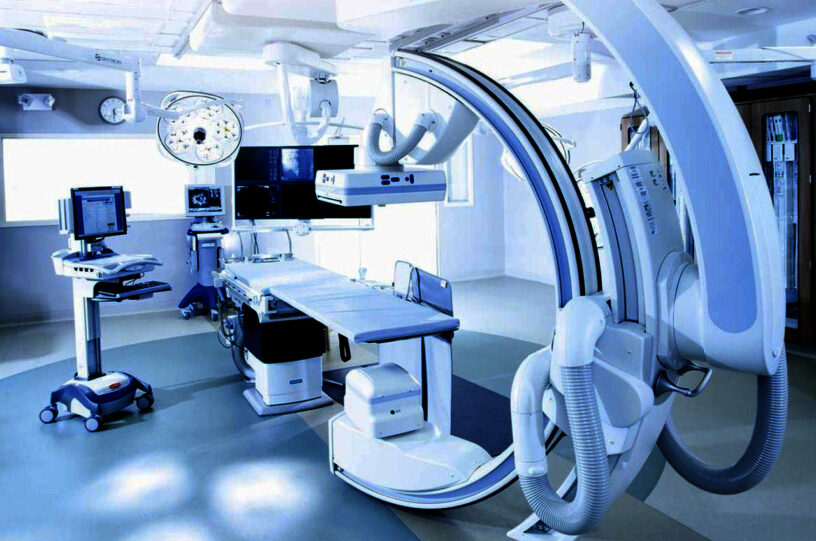Medical Lighting Technologies Market size was valued at USD 2.45 Billion in 2021 and is projected to reach USD 4.11 Billion by 2030, growing at a CAGR of 6.09% from 2022 to 2030.
The Medical Lighting Technologies Market refers to the industry that provides specialized lighting solutions for healthcare environments, including hospitals, clinics, surgical centers, and diagnostic labs. Medical lighting plays a crucial role in improving visibility during medical procedures, enhancing patient comfort, and ensuring the overall safety and efficiency of healthcare services.
Market Overview:
Medical lighting technologies encompass a wide range of products, such as surgical lights, examination lights, specialty lighting systems for diagnostics, and lighting solutions designed for patient rooms and hospital environments. These lighting systems are designed to meet the stringent requirements of medical settings, offering features such as high-intensity illumination, color accuracy, minimal heat emission, and energy efficiency.
Market Size and Growth:
The medical lighting technologies market is growing steadily, driven by advancements in lighting technology, increasing healthcare infrastructure investments, and the rising demand for energy-efficient and durable lighting solutions.
- Market Value: The market is valued at several billion dollars, with growth expected to continue over the next decade.
- CAGR: The market is anticipated to grow at a compound annual growth rate (CAGR) of approximately 5-7% during the forecast period, reflecting ongoing technological innovation and increased healthcare spending.
Key Market Drivers:
- Advancements in Lighting Technology:
- LED Technology: The shift from traditional incandescent and halogen lights to LED (Light Emitting Diode) technology has significantly impacted the market. LEDs offer better energy efficiency, longer lifespan, and superior performance in terms of brightness and color rendering.
- Smart Lighting Systems: The integration of smart lighting solutions, which allow for adjustable intensity, color temperature, and automated controls, is becoming increasingly popular in medical environments.
- Growing Healthcare Infrastructure:
- Hospital and Clinic Expansions: The expansion of healthcare facilities, particularly in emerging markets, is driving the demand for advanced medical lighting systems.
- Increased Surgical Procedures: A rise in the number of surgical procedures globally is boosting the need for high-quality surgical lighting solutions.
- Focus on Energy Efficiency and Sustainability:
- Green Building Initiatives: The growing emphasis on sustainability and energy efficiency in healthcare facilities is driving the adoption of LED and other energy-efficient lighting technologies.
- Cost Savings: Energy-efficient lighting solutions offer long-term cost savings for healthcare facilities, reducing operational expenses.
- Regulatory Standards and Compliance:
- Safety and Performance Standards: Stringent regulations regarding the safety, performance, and quality of medical lighting products are influencing the market. Compliance with standards such as IEC, FDA, and CE is crucial for market participants.
- Accreditation Requirements: Hospitals and clinics seeking accreditation must adhere to specific lighting standards, driving the demand for compliant lighting systems.
- Patient Comfort and Well-Being:
- Human-Centric Lighting: The adoption of human-centric lighting systems, which mimic natural daylight and can be adjusted to improve patient comfort and well-being, is gaining traction in healthcare settings.
- Enhanced Patient Experience: Proper lighting in patient rooms and common areas contributes to a better patient experience, which is increasingly prioritized by healthcare providers.
Market Segmentation:
The medical lighting technologies market can be segmented based on product type, application, technology, and geography.
- By Product Type:
- Surgical Lighting Systems: High-intensity lighting systems designed for operating rooms to provide clear visibility during surgeries.
- Examination Lights: Used in examination rooms and clinics to illuminate patient areas during diagnostic and minor surgical procedures.
- Specialty Lighting: Includes lighting systems for diagnostic imaging, endoscopy, and other specialized medical applications.
- Ambient Lighting: General lighting for patient rooms, hallways, and common areas within healthcare facilities.
- By Application:
- Hospitals: The largest segment, driven by the need for specialized lighting in operating rooms, ICUs, and patient rooms.
- Clinics and Ambulatory Surgical Centers: A growing segment as these facilities expand and require advanced lighting solutions.
- Diagnostic Laboratories: Specialized lighting for accurate diagnostics and laboratory work.
- By Technology:
- LED Lighting: The dominant technology, offering energy efficiency, durability, and superior performance.
- Halogen Lighting: Still used in some applications, though being phased out in favor of LED.
- Fluorescent Lighting: Used in general and ambient lighting, though also being replaced by LED systems.
- By Geography:
- North America: Holds a significant market share due to advanced healthcare infrastructure and early adoption of new technologies.
- Europe: Another major market with a focus on energy efficiency and stringent regulatory standards.
- Asia-Pacific: Expected to witness rapid growth due to increasing healthcare investments and expanding infrastructure.
- Latin America and Middle East & Africa: Emerging markets with growing healthcare needs and infrastructure development.
Trends:
- Integration of Smart and Connected Lighting:
- IoT Integration: The integration of Internet of Things (IoT) technology in medical lighting allows for remote monitoring, automation, and data collection, enhancing the efficiency and customization of lighting systems.
- Adaptive Lighting Solutions: Smart lighting systems that adapt to the time of day, type of procedure, and specific needs of healthcare professionals and patients are gaining popularity.
- Adoption of Human-Centric Lighting:
- Circadian Rhythm Alignment: Lighting systems designed to align with the natural circadian rhythms of patients and healthcare workers, improving sleep patterns, mood, and overall well-being.
- Adjustable Lighting for Patient Comfort: Systems that allow for easy adjustment of light intensity and color temperature to create a comfortable and soothing environment for patients.
- Focus on Infection Control:
- Antimicrobial Lighting Solutions: The development of lighting systems with antimicrobial properties, particularly in high-risk areas such as operating rooms and ICUs, to reduce the risk of hospital-acquired infections.
- UV-C Lighting: The use of UV-C lighting for disinfection purposes, particularly in sterilizing surfaces and air in healthcare environments.
- Sustainability and Environmental Impact:
- Energy-Efficient Designs: The ongoing push towards more energy-efficient designs, with a focus on reducing the carbon footprint of healthcare facilities.
- Eco-Friendly Materials: The use of sustainable and recyclable materials in the manufacturing of medical lighting systems.
- Customization and Modular Lighting:
- Modular Systems: The trend towards modular lighting systems that can be easily customized and reconfigured to meet the specific needs of different healthcare settings.
- Design Flexibility: Increased demand for lighting systems that offer flexibility in design and installation, allowing for tailored solutions in various medical environments.
Challenges:
- High Initial Costs:
- Investment Costs: The high initial investment required for advanced medical lighting systems, particularly LED and smart lighting, can be a barrier for smaller healthcare facilities.
- Cost-Benefit Analysis: Healthcare providers must balance the initial costs with long-term benefits, such as energy savings and improved patient outcomes.
- Complexity of Installation and Integration:
- Technical Expertise: The installation and integration of advanced lighting systems, particularly those involving IoT and smart technologies, require specialized technical expertise.
- Integration with Existing Systems: Ensuring seamless integration with existing infrastructure and medical equipment can be challenging.
- Regulatory and Compliance Issues:
- Stringent Regulations: The need to comply with stringent regulatory standards can be challenging for manufacturers, particularly when entering new markets with different regulatory requirements.
- Approval Delays: Obtaining regulatory approvals for new lighting technologies can be time-consuming, delaying market entry.
- Maintenance and Longevity:
- Durability Concerns: While LED and advanced lighting systems offer longer lifespans, ensuring consistent performance and durability in demanding medical environments is essential.
- Maintenance Requirements: Regular maintenance and updates are necessary to ensure optimal performance, particularly for smart and connected lighting systems.
Future Outlook:
The medical lighting technologies market is expected to continue growing, driven by ongoing advancements in lighting technology, increasing healthcare infrastructure investments, and the rising demand for energy-efficient and patient-centric lighting solutions. The shift towards smart and connected lighting systems, coupled with the growing emphasis on sustainability and infection control, will likely shape the future of the market.
As healthcare providers increasingly focus on enhancing patient outcomes and operational efficiency, the demand for innovative, customizable, and compliant lighting solutions will rise. The market is also poised to expand in emerging economies, where healthcare infrastructure development is progressing rapidly.
Click Here, To Get Free Sample Report https://stringentdatalytics.com/sample-request/medical-lighting-technologies-market/15905/
Market Segmentations:
Global Medical Lighting Technologies Market: By Company
Eaton
A-dec
Acem
Excelitas Technologies
Glamox
Acuity Brands
Planet Lighting
LiD
Kenall
Lumitex
Philips
Trilux
StarTrol
Whitecroft Lighting
Gerard Lighting
GE
Hill-Rom
Hubbell
Herbert Waldmann
Global Medical Lighting Technologies Market: By Type
LED
Halogen
Incandescent
Others
Global Medical Lighting Technologies Market: By Application
Hospitals
Outpatient Facilities
Dental Hospitals
Others
Global Medical Lighting Technologies Market: Regional Analysis
The regional analysis of the global Medical Lighting Technologies market provides insights into the market’s performance across different regions of the world. The analysis is based on recent and future trends and includes market forecast for the prediction period. The countries covered in the regional analysis of the Medical Lighting Technologies market report are as follows:
North America: The North America region includes the U.S., Canada, and Mexico. The U.S. is the largest market for Cold-chain Pharma in this region, followed by Canada and Mexico. The market growth in this region is primarily driven by the presence of key market players and the increasing demand for the product.
Europe: The Europe region includes Germany, France, U.K., Russia, Italy, Spain, Turkey, Netherlands, Switzerland, Belgium, and Rest of Europe. Germany is the largest market for Cold-chain Pharma in this region, followed by the U.K. and France. The market growth in this region is driven by the increasing demand for the product in the automotive and aerospace sectors.
Asia-Pacific: The Asia-Pacific region includes Singapore, Malaysia, Australia, Thailand, Indonesia, Philippines, China, Japan, India, South Korea, and Rest of Asia-Pacific. China is the largest market for Cold-chain Pharma in this region, followed by Japan and India. The market growth in this region is driven by the increasing adoption of the product in various end-use industries, such as automotive, aerospace, and construction.
Middle East and Africa: The Middle East and Africa region includes Saudi Arabia, U.A.E, South Africa, Egypt, Israel, and Rest of Middle East and Africa. The market growth in this region is driven by the increasing demand for the product in the aerospace and defense sectors.
South America: The South America region includes Argentina, Brazil, and Rest of South America. Brazil is the largest market for Cold-chain Pharma in this region, followed by Argentina. The market growth in this region is primarily driven by the increasing demand for the product in the automotive sector.
Click Here, To Buy Premium Report https://stringentdatalytics.com/purchase/medical-lighting-technologies-market/15905/?license=single
About Stringent Datalytics
Stringent Datalytics offers both custom and syndicated market research reports. Custom market research reports are tailored to a specific client’s needs and requirements. These reports provide unique insights into a particular industry or market segment and can help businesses make informed decisions about their strategies and operations.
Syndicated market research reports, on the other hand, are pre-existing reports that are available for purchase by multiple clients. These reports are often produced on a regular basis, such as annually or quarterly, and cover a broad range of industries and market segments. Syndicated reports provide clients with insights into industry trends, market sizes, and competitive landscapes. By offering both custom and syndicated reports, Stringent Datalytics can provide clients with a range of market research solutions that can be customized to their specific needs.
Contact Us
Stringent Datalytics
Contact No- +1 346 666 6655
Email Id- sales@stringentdatalytics.com
Web- https://stringentdatalytics.com/




Leave a Reply